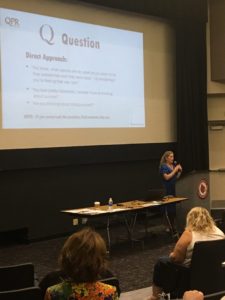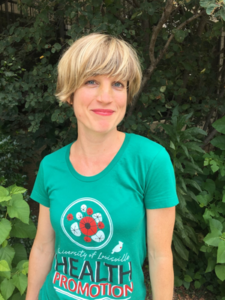
Recently, a room full of attendees from all over Louisville Metro, including a number from UofL, listened to a presentation on what they could do to prevent suicide.
The program, called QPR, which stands for “Question, Persuade, Refer” trains people to react to warnings of suicide with the same kind of step-by-step, quick-action, life-saving procedure as CPR.

“This helps a person know how to react when someone they know is exhibiting signs of suicide,” said Tracie Meyer, Coordinator of Cards SPEAK, UofL’s suicide prevention program.
Cards Speak offered the training in collaboration with The Louisville Health Advisory Board (LHAB) Behavioral Health Committee and the Kentucky State Zero Suicide Grant program.
“The LHAB has set a Bold Goal of providing QPR training to 10,000 Jefferson County residents during National Suicide Prevention Week, which is September 9-15,” Meyer said. “We are in the beginning stages of planning these events, and this was one of them. We have QPR trainers traveling throughout Kentucky, Ohio, Indiana and Tennessee to help us reach our goal.”
The training encourages people to listen and watch for suicide warning signs. It provides dialogue to help ascertain if a person needs professional assistance and if so, guide them to it.
Sara Choate, interim program manager at Health Promotion, a division of Campus Health Services, said the training is important now more than ever, as a report released this summer by the Centers for Disease Control and Prevention revealed that suicide rates rose in all but one state between 1999 and 2016, with increases seen across age, gender, race and ethnicity.
According to the Washington Post, nearly 45,000 suicides occurred in the U.S. in 2016 — more than twice the number of homicides — making it the 10th-leading cause of death.
Of particular concern Choate said, is that suicide is the second-leading cause of death for ages 15 to 34, which is the typical age range of UofL’s student population.

“Our mission at health promotion at UofL is to offer services, resources and programs for students that address how they can embolden their well-being and resilience in their personal and academic lives,” she said. “Our students are in this high risk age group. So, it’s our responsibility in the health promotion field, especially on campus, to talk about creating opportunities to improve social connectedness, which is one of the main protective factors.”
Meyer said that there are a number of others on campus who have already received QPR Training, especially in Campus Housing and in the Dean of Students Office. All first-year medical students undergo the training, too.
There will be additional free, 90-minute QPR Suicide Prevention Training sessions offered throughout Louisville Sept 9-15. Register here.
Click here for ways to help if you know someone who is exhibiting signs of suicide.
































